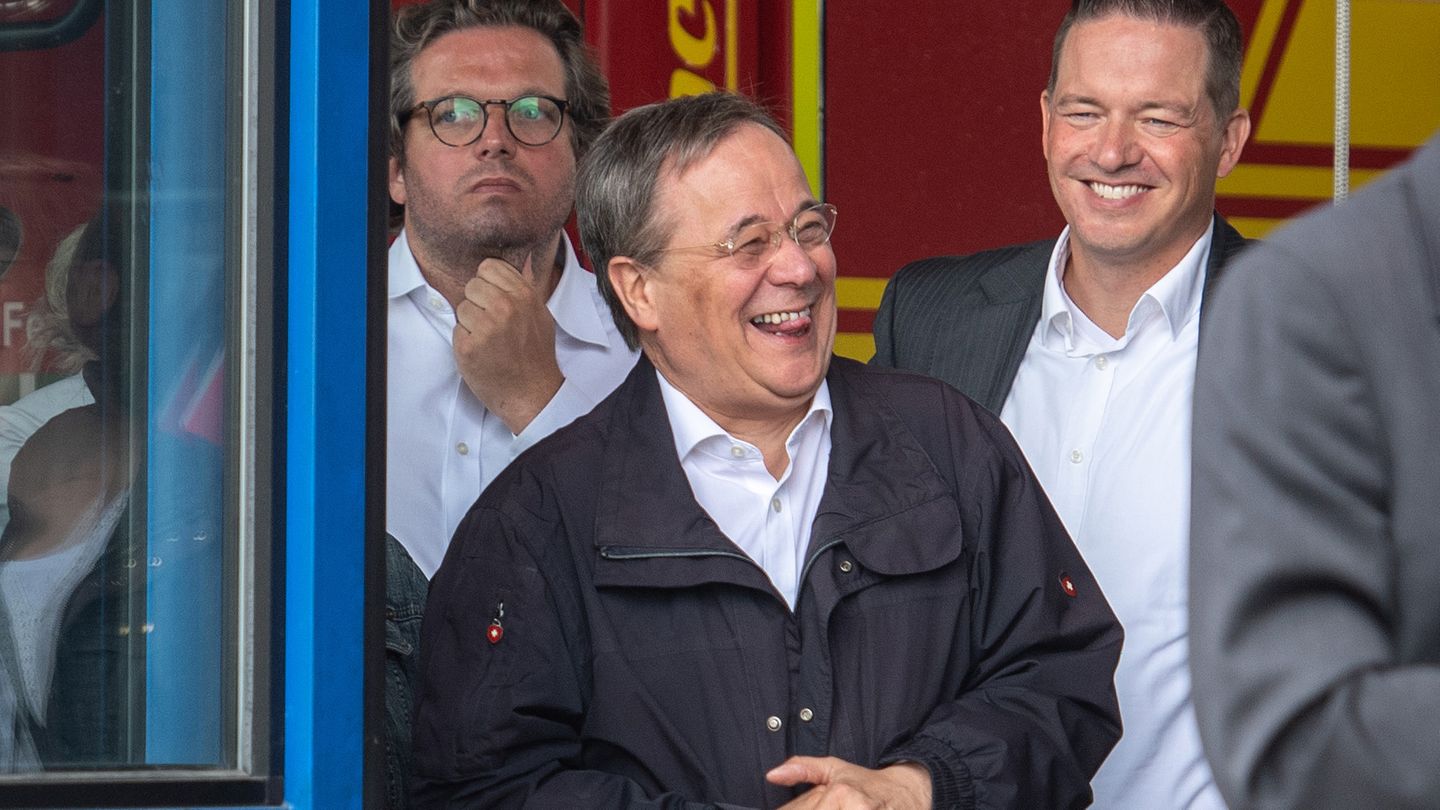Armin Laschet’s laughter in the storm disaster area earned him a lot of criticism. In the ZDF “summer interview” the Chancellor Lady of the Union regretted his behavior again. He also spoke out against compulsory vaccination.
Union Chancellor candidate Armin Laschet (CDU) called his much-criticized laugh during a visit to Erftstadt, which was particularly affected by the storm, a week ago as “stupid”. “It was stupid and it shouldn’t be and I regret it,” said the North Rhine-Westphalian Prime Minister in the ZDF “summer interview”, which is to be broadcast on Sunday evening at 7:10 pm. Laschet did not want to give any further information, which triggered his laughter during a speech by Federal President Frank-Walter Steinmeier.
The CDU chief said he wanted to come up with issues in the election campaign before the federal election in September. He hoped it could be discussed thematically in the next few weeks, “because there is a lot at stake for Germany”. It is about a directional decision on how Germany can regain economic growth after the corona pandemic.
Armin Laschet: “Don’t believe in compulsory vaccinations”
Laschet also spoke out against compulsory vaccination and restrictions for unvaccinated people in the corona pandemic. “I do not believe in compulsory vaccinations and do not believe in indirectly putting pressure on people to get vaccinated,” said the CDU chief in the ZDF interview. The priority must now be to convince as many citizens as possible to be vaccinated against Corona.
According to Chancellery Minister Helge Braun (CDU), sensitive restrictions could soon be threatened again in view of the renewed increase in the number of infections for unvaccinated people. “That can also mean that certain offers such as restaurant, cinema and stadium visits would no longer be possible even for tested unvaccinated people because the residual risk is too high,” he told “Bild am Sonntag”.
Laschet, on the other hand, emphasized that the principle that you either have to be vaccinated, tested or recovered in order to do certain things is correct. “In a free state there are freedom rights, not just for certain groups,” he emphasized. The goal must be to fight the pandemic in such a way that all freedoms and fundamental rights are reinstated.
Tax cuts if they can be financed
A high vaccination rate is important for this. “And I think we have to do everything we can to convince people that we can get more vaccinated,” said Laschet. “If we then see in autumn that the vaccination rate is still far too low, I think we have to think further. But not now.”
Regarding tax cuts, the Chancellor candidate said that the tax cuts announced in the Union’s election manifesto are subject to financial feasibility. “If they can be financed, we are in favor of relieving the burden on small and medium incomes,” said the CDU chief.
At the same time, it is known that the federal government’s cash position is difficult and that large investments are imminent. “And if you stick to the debt brake, which is in the constitution, and don’t want any new taxes, you can only generate additional income through economic growth.” How strong this growth will be will only be known in the coming months or years.
Armin Laschet against an early exit from coal
Therefore, in principle, the Union’s electoral program is not a tax cut program. “We want stable government finances and not dubious promises,” Laschet emphasized. Promising tax relief across the board is not serious. In its election program, however, the Union provides for the abolition of the solidarity surcharge for the top ten percent and relief for families. “Everything according to the financial situation,” emphasized Laschet.
What is not possible, however, is to increase taxes – as the competitors for the Chancellery wanted. That “would be really poison for innovations, for the economy and for new jobs,” said Laschet.
Laschet also rejected the request by CSU boss Markus Söder to bring the coal phase out to 2030. “I think politics must be reliable,” he said. It could not be that last year 2038 was set as the exit year and then this year will start again with new data. “That’s why I think we should stay on schedule.”
Laschet pointed out that the 2038 phase-out year had been proposed by the coal commission. Scientists as well as environmentalists were active in this. The experts had included ecological reasons as well as the social consequences for the employees concerned in the proposal.
Personally, however, he himself also believes that the exit will take place more quickly, and that this will result solely from the CO2 price. In any case, his state of North Rhine-Westphalia could manage to get completely out of coal by 2030, said the North Rhine-Westphalian Prime Minister on ZDF.
David William is a talented author who has made a name for himself in the world of writing. He is a professional author who writes on a wide range of topics, from general interest to opinion news. David is currently working as a writer at 24 hours worlds where he brings his unique perspective and in-depth research to his articles, making them both informative and engaging.




